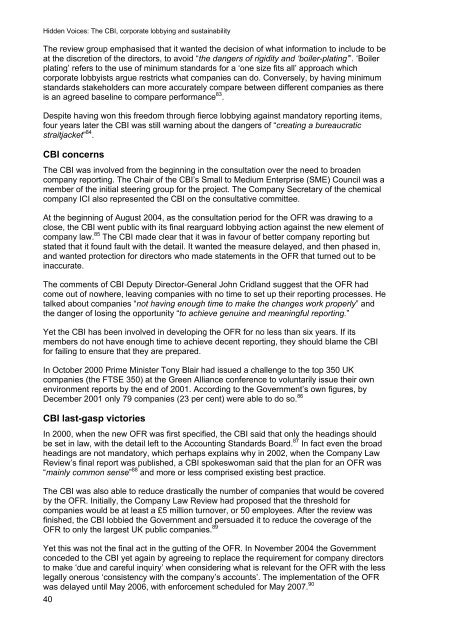hidden_voices
hidden_voices
hidden_voices
You also want an ePaper? Increase the reach of your titles
YUMPU automatically turns print PDFs into web optimized ePapers that Google loves.
Hidden Voices: The CBI, corporate lobbying and sustainabilityThe review group emphasised that it wanted the decision of what information to include to beat the discretion of the directors, to avoid “the dangers of rigidity and ‘boiler-plating’”. ‘Boilerplating’ refers to the use of minimum standards for a ‘one size fits all’ approach whichcorporate lobbyists argue restricts what companies can do. Conversely, by having minimumstandards stakeholders can more accurately compare between different companies as thereis an agreed baseline to compare performance 83 .Despite having won this freedom through fierce lobbying against mandatory reporting items,four years later the CBI was still warning about the dangers of “creating a bureaucraticstraitjacket” 84 .CBI concernsThe CBI was involved from the beginning in the consultation over the need to broadencompany reporting. The Chair of the CBI’s Small to Medium Enterprise (SME) Council was amember of the initial steering group for the project. The Company Secretary of the chemicalcompany ICI also represented the CBI on the consultative committee.At the beginning of August 2004, as the consultation period for the OFR was drawing to aclose, the CBI went public with its final rearguard lobbying action against the new element ofcompany law. 85 The CBI made clear that it was in favour of better company reporting butstated that it found fault with the detail. It wanted the measure delayed, and then phased in,and wanted protection for directors who made statements in the OFR that turned out to beinaccurate.The comments of CBI Deputy Director-General John Cridland suggest that the OFR hadcome out of nowhere, leaving companies with no time to set up their reporting processes. Hetalked about companies “not having enough time to make the changes work properly” andthe danger of losing the opportunity “to achieve genuine and meaningful reporting.”Yet the CBI has been involved in developing the OFR for no less than six years. If itsmembers do not have enough time to achieve decent reporting, they should blame the CBIfor failing to ensure that they are prepared.In October 2000 Prime Minister Tony Blair had issued a challenge to the top 350 UKcompanies (the FTSE 350) at the Green Alliance conference to voluntarily issue their ownenvironment reports by the end of 2001. According to the Government’s own figures, byDecember 2001 only 79 companies (23 per cent) were able to do so. 86CBI last-gasp victoriesIn 2000, when the new OFR was first specified, the CBI said that only the headings shouldbe set in law, with the detail left to the Accounting Standards Board. 87 In fact even the broadheadings are not mandatory, which perhaps explains why in 2002, when the Company LawReview’s final report was published, a CBI spokeswoman said that the plan for an OFR was“mainly common sense” 88 and more or less comprised existing best practice.The CBI was also able to reduce drastically the number of companies that would be coveredby the OFR. Initially, the Company Law Review had proposed that the threshold forcompanies would be at least a £5 million turnover, or 50 employees. After the review wasfinished, the CBI lobbied the Government and persuaded it to reduce the coverage of theOFR to only the largest UK public companies. 89Yet this was not the final act in the gutting of the OFR. In November 2004 the Governmentconceded to the CBI yet again by agreeing to replace the requirement for company directorsto make ‘due and careful inquiry’ when considering what is relevant for the OFR with the lesslegally onerous ‘consistency with the company’s accounts’. The implementation of the OFRwas delayed until May 2006, with enforcement scheduled for May 2007. 9040


